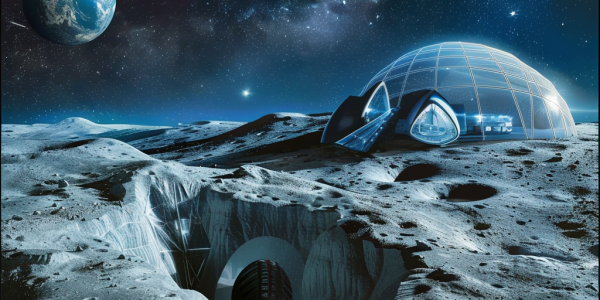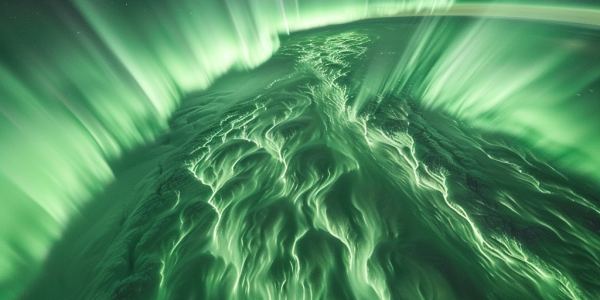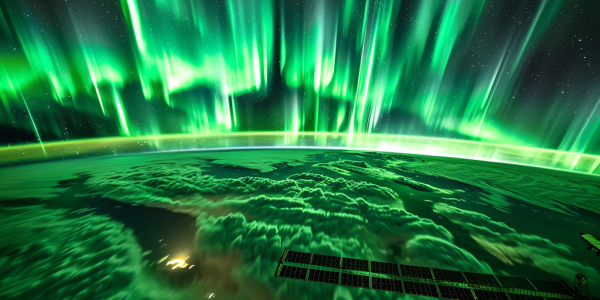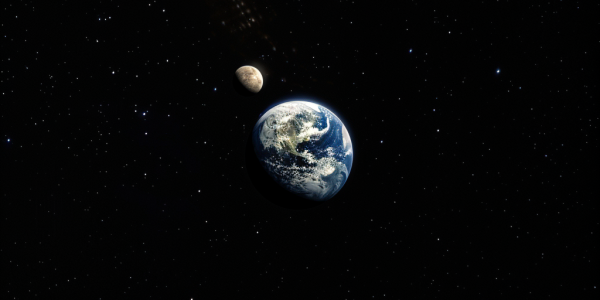Northern Lights Set to Dazzle US Skywatchers for Next Two Years
The aurora borealis, or Northern Lights, will be visible across the U.S. for the next two years due to a recent solar superstorm. This significant G5-rated geomagnetic storm has enhanced our understanding of Earth’s upper atmosphere and offers skywatchers an exciting opportunity to witness this natural spectacle. Researchers emphasize the importance of studying these storms to predict their impacts on satellite communications and navigation.
Scientists Propose Lunar Biorepository to Preserve Earth’s Biodiversity
Scientists propose a revolutionary lunar biorepository to preserve Earth’s biodiversity amidst climate change and habitat loss. This innovative facility aims to store critical biological samples, including DNA from endangered species, in the moon’s frigid environment, ensuring their survival against extinction. As climate threats escalate, this groundbreaking concept could redefine conservation strategies and safeguard genetic diversity for future generations.
New Research Unveils Groundbreaking Insights into Earth’s Ancient Mantle
Recent research from the Smithsonian’s National Museum of Natural History reveals groundbreaking insights into Earth’s geological history through the study of 2.5 billion-year-old ‘time capsule’ rocks. These findings challenge long-held beliefs about the oxidation state of the Earth’s mantle, suggesting stability over geological time. This research not only enhances our understanding of Earth’s early processes but also connects to the broader narrative of life’s origins on our planet.
Moon Drifting Away: Implications for Earth’s Days and Geological Processes
Recent studies reveal that the Moon is drifting away from Earth at a rate of 3.82 centimeters per year, potentially lengthening our days to 25 hours in 200 million years. Research from the University of Wisconsin-Madison explores the Earth-Moon relationship, uncovering insights into geological processes and the Moon’s complex history. Discover how this celestial movement could impact tides, climate, and life on Earth.
Central Maine Prepares for Northern Lights Spectacle Amid Solar Storm
Central Maine residents are excited for the upcoming solar storm that may reveal the northern lights, or aurora borealis. The National Oceanic and Atmospheric Administration (NOAA) predicts peak visibility around 2 a.m. on Wednesday, with optimal viewing in areas like Skowhegan. This year has been favorable for aurora sightings, and local experts advise finding dark locations for the best chance to witness this stunning natural phenomenon.
Scientists Discover Rare ‘Polar Rain’ Aurora Over Arctic Region
Discover the mesmerizing ‘polar rain’ aurora observed for the first time on Christmas Day 2022 over the Arctic region. Japanese and US-based researchers unveil the unique origins of this rare phenomenon, shedding light on the mysterious green glow spanning 2,485 miles. Learn how data from satellites unraveled the secrets of this unprecedented celestial event, marking a significant milestone in understanding auroral dynamics and space weather.
Insights from World’s Oldest Crystals Shed Light on Earth’s Ancient History
Discover the fascinating insights into Earth’s ancient history revealed by the world’s oldest crystals found in Western Australia’s Jack Hills. Geologists using machine learning techniques have uncovered that these ancient rocks were sedimentary in nature, suggesting a familiar landscape over four billion years ago. The enduring zircons offer valuable clues to the planet’s evolution, shedding light on the Earth’s swift transformation into its current form. Professor Ross Mitchell emphasizes the importance of understanding these ancient rocks in unraveling the secrets of the planet’s geological history.
Stunning Green Aurora Dance Captured from ISS
Experience the mesmerizing dance of green aurora in the night sky captured from the International Space Station (ISS). This enchanting footage shared on Instagram showcases the beauty of this natural phenomenon that often leaves viewers in awe. Witness the ethereal dance of the green aurora against the backdrop of the dark night sky, creating a visual spectacle that is both captivating and awe-inspiring. Stay connected with us for more captivating stories and updates across various categories.
New Theory On Why We Are Alone In The Cosmos—Tectonic Plates
New research suggests that the presence of oceans, continents, and plate tectonics on Earth may be the reason for the lack of evidence of advanced extraterrestrial civilizations. Geoscientists from the University of Texas at Dallas and the Swiss Federal Institute of Technology propose a change to the Drake Equation, emphasizing the importance of plate tectonics in the emergence of intelligent life.
Earth Reaches Aphelion, Furthest Distance from the Sun
Discover the beauty of Earth’s aphelion, the farthest distance from the sun, and how gravitational forces shape the orbits of planets in our solar system. Learn about the dynamic celestial dance and the intriguing phenomena that govern our universe.










